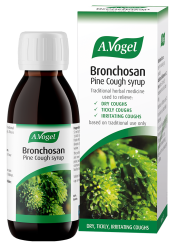What are coughs?
A cough is the sudden expulsion of air from the passages of the respiratory tract. It serves the purpose of clearing our airways of mucus, bugs and foreign particles.
Coughs are something we are familiar with. We have all used this mechanism without thinking, for instance, to clear a bit of mucus at the back of our throats before speaking.
However, sometimes coughs are not controllable and come in spasms. Usually, these are caused by viral infections such as colds or flu giving rise to inflammation, triggering the cough reflex.
Types of cough
While you may be bringing up a lot of mucus when you cough, the person next to you might be experiencing a dry or tickly cough. This is because coughs can be described in a number of different ways:
- Chesty cough – this type of cough is also known as a productive or mucous cough because it expels mucus from the upper airways
- Tickly cough – this cough does not produce mucus and is known as a non-productive cough. Something is irritating your throat and this stimulates the cough reflex
- Dry cough – this is another non-productive cough and is similar to a tickly cough although causes can be different
- Persistent cough – this is a cough which lingers for more than three weeks. The term can be applied to both productive and non-productive coughs
- Smoker’s cough – this is the result of long-term smoking and arises as the lungs try to clear of toxins gathering in the respiratory system.
The cough reflex
Coughing is one of the body’s protective mechanisms. It serves the purpose of keeping our respiratory system clear.
The lining of our respiratory tract, from the back of our throat to the depths of our lungs, is richly supplied by nerve endings. When these are irritated, nerve signals pass to the cough centre of the brain, triggering a series of coordinated muscular actions leading to a cough. This is known as the cough reflex.
The larynx (commonly known as the voice-box) is closed momentarily by the epiglottis. This is followed, almost simultaneously, by the contraction of muscles in the abdomen and chest, which builds up pressure within the upper airways.
When the epiglottis relaxes again, the larynx opens and a short burst of approximately 1.5 litres of air from our lungs is released through the upper airways giving rise to the characteristic coughing sound.
This blast of air has been measured at speeds of up to 50mph, pushing unwanted material out of the upper airways and also releasing up to 3,000 tiny droplets of saliva.
Causes of coughing
Coughs can be caused by a wide variety of factors:
- Viruses responsible for colds and flu are perhaps the most common causes leading to chesty, tickly and dry coughs
- Smoking is associated with chesty coughs as cigarette smoke irritates the lungs and an excessive amount of mucus is produced. This gives rise to the characteristic sound of the ‘smoker’s cough’
- Hayfever and other allergies can sometimes lead to a cough. This is because it can cause inflammation in the respiratory system leading to a dry or tickly cough.
- Feeling nervous and under stress can cause a dry cough - for example, during a job interview
- Dry coughs may also be associated with psychological conditions including low mood or depression
- All types of cough can be a sign of a variety of lung conditions ranging from asthma to lung cancer
- Heart disease can lead to fluid building up in the lungs giving rise to a dry cough initially and latter a cough which brings up white, frothy sputum
- Certain prescribed medicines may produce dry coughs as a side effect
Cough remedies
The remedy that will cure your cough will depend on the type of cough and its cause. Cough remedies can be divided into two main categories:
- Expectorants – these are usually used for chesty coughs and act by thinning excess mucus in your lungs making it easier for you to clear your respiratory system when you cough
- Antitussives – these are used for dry, tickly coughs and soothe your throat, suppressing the cough reflex.
Both expectorants and anti-tussives are available as conventional medicines prescribed by your doctor or from your pharmacy, as well as licensed herbal remedies available from health food stores and pharmacies.
Find out about other types of cough remedies available.
When should I go to the doctor?
Most coughs, particularly those associated with colds and flu, disappear quickly. However, coughs can also be caused by other conditions, some of which may require medical attention. You should seek advice if you:
- Cough up blood
- Feel short of breath or wheezy
- Experience chest pain or tightness in your chest
- Suffer from asthma and experience a cough, especially at night
- Have a cough that does not improve within 7 days
- Suffer from an unexplained persistent cough (one lasting longer than 3 weeks)
- Are also feeling tired or lethargic
- Experience fever
- Notice unexplained weight loss.








